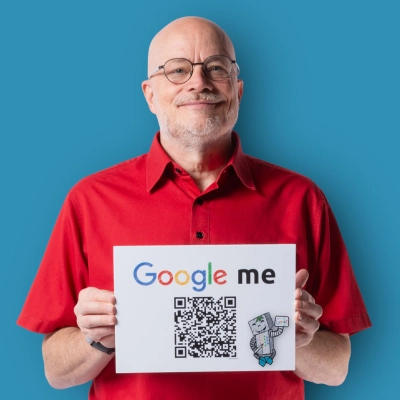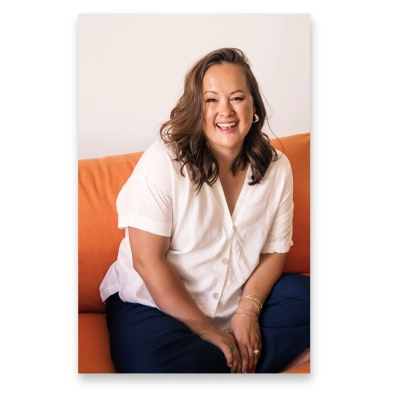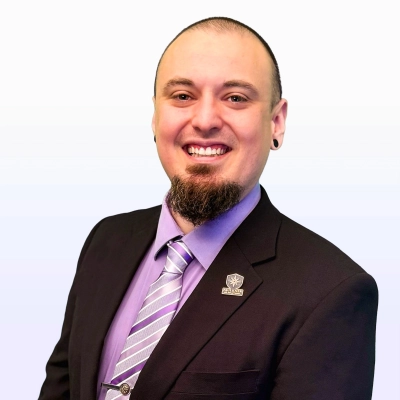How to Overcome Challenges in Building a Personal Brand Online
Building a personal brand online presents challenges that many professionals struggle to overcome. We asked industry experts to share one challenge they’ve faced while building their personal brand online — and how they overcame it. Discover strategies for creating a consistent brand identity that resonates with your target audience while staying true to yourself.- Redefining Digital Identity Beyond Past Success
- Stop Editing Yourself for Others’ Comfort
- Developing a Unique Voice in Crowded Spaces
- Embracing Authenticity Despite Fear of Judgment
- Creating Clarity and Consistency for Target Audience
- Turning Accent into International Expertise Advantage
- Transform Vulnerabilities into Sources of Authority
- Shifting from Perfection to Authentic Storytelling
- Focus on Expertise to Maintain Sustainable Consistency
- Building Trust Through Personal Connection Abroad
- Continue Working with Integrity Despite Criticism
- Managing Expectations Through Measurable Small Wins
- Balancing Professional Image with Authentic Self
- Reframing Self-Promotion as Sharing Valuable Insights
- Share Trade Secrets to Build Trust
- Recognizing Your Value Through External Perspective
- Remember Your Purpose Despite Negative Comments
- Finding a Starting Point for Brand Identity
Redefining Digital Identity Beyond Past Success
My biggest challenge was that for years, Google thought I was a blue dog. It sounds absurd, but it’s true. From 1998 to 2011, as the CEO and founder of UpToTen Ltd, I ran a popular children’s website featuring a cartoon character I co-created, Boowa. We were successful, working with brands like Disney, Samsung, and ITV Studios. But when I pivoted my career to digital marketing, the powerful digital echo of Boowa the blue dog completely drowned out my new narrative. Google’s algorithms were clinging onto the most prominent signal it could find: the cartoon. To overcome this, I had to systematically re-educate the algorithm. I started by creating a definitive source of truth about myself on my personal website (what I now call an Entity Home). Then, I built a consistent narrative across the web, using interviews, articles, and profiles on trusted third-party sites to corroborate the facts about who I am now (entrepreneur and digital marketer). This methodical process of establishing facts and proving them through corroboration solved my “blue dog” problem and also became the foundation of The Kalicube Process that we use to engineer brand narratives for our clients today. Jason BARNARD, Serial Entrepreneur, Kalicube
Jason BARNARD, Serial Entrepreneur, Kalicube
Stop Editing Yourself for Others’ Comfort
The hardest part of building my personal brand was dealing with the discomfort of being visible. Especially online. It wasn’t strangers that made it hard. It was people close to me. Comments like, “What is she doing?” or, “Who does she think she is?” made me pause. Even if no one said it directly, I felt it. And I started to hold back. I’d reread every post. I’d soften my tone. Not because I didn’t know what I wanted to say but because I didn’t want to deal with the weight of people’s opinions of me. I remember thinking, if my own family thinks this, what do people who don’t even know me think? I stopped trying to manage how I was perceived. I started focusing on being consistent. Personal branding, to me, is more about personal reputation. Especially while building a business. It’s how people describe you when you’re not in the room. It’s what your words feel like over time. That mindset shift helped. I didn’t need to say more. I just needed to say what I actually meant, in a voice I could stand behind. I also read “Let Them” by Mel Robbins. It helped me stop trying to control how people respond. Let them think what they want. The right people will stick around. And that’s who I care about.
 Ashley Kedra, Founder, Kedra&Co
Ashley Kedra, Founder, Kedra&Co
Developing a Unique Voice in Crowded Spaces
One challenge I faced while building my personal brand online was finding my authentic voice in a noisy digital space. Early on, I caught myself imitating what worked for others: those polished posts, trendy jargon, and generic success tips. The result? My personality got diluted, and my content just blended into the background. I overcame this by approaching my own brand like I would a client’s. I started with clarity by asking myself three simple questions: What do I want to be known for? Who do I want to help? And what unique perspective do I bring that nobody else can? These answers became my filter. Content that didn’t align simply had to go. Gradually, my online presence transformed from merely posting for visibility to genuinely sharing for impact. The real lesson here is that your personal brand only resonates when it mirrors who you truly are offline. When I committed to consistency writing in my natural voice, sharing actual experiences instead of recycled advice, and being transparent about both successes and setbacks, people began to trust me more. Authenticity isn’t just another buzzword. It’s what separates being noticed once from being remembered for the long haul. Bhavik Sarkhedi, Founder & CEO, Ohh My Brand
Bhavik Sarkhedi, Founder & CEO, Ohh My Brand
Embracing Authenticity Despite Fear of Judgment
One of the biggest challenges I faced while building my personal brand online was putting myself out there — really showing the personal side of my life. As an autistic adult, I carried a lot of fear about how people would react. Would they make fun of me? Would they see me as some “freak” because I don’t fit into society’s idea of normal? That fear kept me quiet for a long time, holding back the parts of myself that were most authentic. But over time, I realized that holding back was holding me back from connecting with the people I actually wanted to reach. When I started opening up about my experiences — the struggles, the quirks, the daily realities of being autistic — something surprising happened. People didn’t judge; they resonated. They reached out, shared their own stories, and told me that seeing me be real gave them permission to be real too. That was a game-changer for my personal brand. I learned that authenticity isn’t just a buzzword — it’s the bridge between you and your audience. By embracing vulnerability, I built trust, connection, and community. Sharing my story didn’t make me weaker; it made me stronger and allowed me to connect with people on a level I never could have imagined. That lesson has become the foundation of everything I do online, from blogging to speaking to advocacy work. Jimmy Clare, Professional Keynote Speaker, Podcaster, Live Stream Host, and Autism Advocate, CrazyFitnessGuy
Jimmy Clare, Professional Keynote Speaker, Podcaster, Live Stream Host, and Autism Advocate, CrazyFitnessGuy
Creating Clarity and Consistency for Target Audience
I think the hardest part of building my personal brand online has been twofold: figuring out how to stand out when there are millions of others out there, and making sure the right people could find me. When I first started creating content, I felt like I was shouting to a crowded room. I was making great content, but I was attracting the wrong crowd (at best) or no crowd at all (at worst). What changed things was realizing that success wasn’t about being louder or trendier. It was about clarity and consistency. I doubled down on telling my story the way I actually live it: cuss words, messy metaphors, self-deprecating humor and all. I leaned into a content ecosystem approach: SEO-driven blogs (yes, SEO still matters), nurture emails, and social posts that all laddered up to the same core message. Comments on LinkedIn posts, Reddit posts, and Substack posts that mattered to me. Conversations with creators I found really interesting. These activities made me recognizable in the communities that I wanted to be found in AND searchable on the internet as a whole. Once I stopped trying to appeal to everyone and started speaking directly to the kind of founders and small business owners that I want to work with, the right people started showing up in my DMs, email, and comments. The moral of the story is that standing out isn’t about volume. Standing out is about alignment. Get clear, stay consistent, and let your real voice do the filtering for you. Cari Kaufman, Brand Strategist/Chief Wordsmith, Storyteller Wordsmith
Cari Kaufman, Brand Strategist/Chief Wordsmith, Storyteller Wordsmith
Turning Accent into International Expertise Advantage
One of the biggest challenges I faced while building my personal brand was being taken seriously as an international SEO expert despite having a Swiss accent and non-native English. Early in my speaking career, I worried that audiences might question my credibility or expertise because of how I sounded rather than focusing on what I knew. This became particularly challenging when I started speaking at global conferences and hosting webinars. I’d notice people commenting on my accent during presentations, and I wasn’t sure if it was helping or hurting my authority. The imposter syndrome was real — here I was, trying to establish myself as the international SEO expert, but wondering if my accent made me seem less credible to English-speaking audiences. I decided to completely reframe my accent as a strategic advantage rather than a limitation. Instead of trying to hide my Swiss background, I made it central to my personal brand story. I realized that my international perspective and multilingual experience were actually rare differentiators in the SEO space, especially for businesses looking to expand globally. I started every speaking engagement by mentioning that I’m “originally from Switzerland” and have been doing SEO “since before Google was called Google — when it was BackRub.” This immediately established both my international credibility and deep industry experience. I also began targeting keywords like “international SEO expert” and “international AI and SEO expert” rather than trying to compete as just another generic SEO consultant. The real shift came when I stopped seeing my accent as something to overcome and started using it as proof of my expertise. When someone searches for international SEO help, who better to trust than someone who’s actually international and has been successfully doing business across cultures and languages for decades? Today, if you search “international SEO expert” on Google, I rank #1 organically and get cited in AI Overviews. My Swiss background and accent have become integral parts of my brand story that audiences remember and associate with authenticity and international expertise.
 Chris Raulf, International AI and SEO Expert | Founder & Chief Visionary Officer, Boulder SEO Marketing
Chris Raulf, International AI and SEO Expert | Founder & Chief Visionary Officer, Boulder SEO Marketing
Transform Vulnerabilities into Sources of Authority
While building my personal brand, I’ve had to decide how much of my personal story to share. As a founder, my journey with autoimmune issues and sensitivity to products is what inspired me to create my company in the first place, but it can leave me feeling very vulnerable, especially when I talk about my suffering, health, or past experiences. I still actively work on overcoming this daily by reframing those challenges as part of my authority. Instead of seeing these challenges as weaknesses, I highlight the way they’ve shaped my judgment and given me the resilience to build a brand founded on integrity while maintaining the highest quality. That shift, choosing to see each vulnerability as a sort of strength, has helped me connect with my audience more intimately. In this way, I position myself as both a founder and a trusted voice in the health, wellness, and beauty sphere.
 Danae DiGiulio, Founder & CEO, CELESTE DU VIDE LLC
Danae DiGiulio, Founder & CEO, CELESTE DU VIDE LLC
Shifting from Perfection to Authentic Storytelling
For me, one of the biggest challenges I faced while building my personal brand online was finding a consistent voice that felt authentic. In the beginning, I tried to model my content after what I saw other successful coaches doing, but that left my posts sounding generic and not truly representative of who I am. I think that many entrepreneurs fall into the same trap of trying to fit into what they believe the market expects instead of leaning into what makes them unique. The turning point came when I stopped focusing on creating content that looked perfect and started sharing real experiences from my coaching practice. I began writing about the struggles clients faced, the strategies we worked on together, and the lessons I took away from those sessions. Once I shifted to storytelling and teaching through lived experience, people started to connect with my posts in a more genuine way. Engagement grew, conversations in my inbox became more frequent, and opportunities flowed naturally from those interactions. In my opinion, the best way to overcome this challenge is to stop chasing perfection and instead commit to showing up consistently with your own perspective. For me, authenticity has been the foundation of trust, and that trust is what ultimately drives business growth. I think that if new entrepreneurs focus less on comparison and more on their unique voice, their personal brand will feel both natural and sustainable. Kelley Stevens, Licensed Marriage and Family Therapist, The Private Practice Pro
Kelley Stevens, Licensed Marriage and Family Therapist, The Private Practice Pro
Focus on Expertise to Maintain Sustainable Consistency
The hardest part of building my personal brand was staying consistent without burning out. At first, I was posting everywhere with no structure, and it just wasn’t sustainable. Things changed when I started focusing only on the questions I kept hearing from clients and peers. That gave me natural content ideas and made the posts feel authentic instead of something “engineered for virality” or the algorithms. The other lesson was patience. It took over a year before it really paid off. I remember this from a few months ago, where without posting anything new, we were able to book 7 meetings in 7 days — just from older posts people found on LinkedIn and Twitter. The biggest lesson here has been: Keep putting out your expertise on socials, the content will soon compound into actual conversions.
 Siddharth Vij, CEO & Design Lead, Bricx Labs
Siddharth Vij, CEO & Design Lead, Bricx Labs
Building Trust Through Personal Connection Abroad
Gaining trust in the German market while managing my company from India was one of the biggest challenges for me to overcome. Germans are unimpressed by frilly words and claims of excellence; they want evidence that you show up and perform your role reliably, and if there is excellence in your work, they want to know how it’s achieved. I spoke almost the entire time about our TYPO3 projects and the growth of the business, but didn’t talk about myself, and that was simply not enough for people to connect with me. Things began to change when I started to share more of my personal journey and experience, our team’s commitment to high-quality work, a few missteps, challenges to the German work culture, and how we adjusted. Also, participating in TYPO3 communities and having direct conversations about unfulfilled promises of service. Eventually, both openness and tenacity instilled absolute trust within the community. People could tell there was a person behind the business who had skin in the game. In this manner, my persona, and therefore my company, grew in increased trust and strength in Germany.
 Nitin Chauhan, CEO, NITSAN
Nitin Chauhan, CEO, NITSAN
Continue Working with Integrity Despite Criticism
The bigger a personal brand you are, the more hate you’re going to get. My personal brand as an online course creator and coach has had its ups that are mirrored with absolute lows. There was a time at the peak of my career when I was posted on a Reddit thread created with the main goal of hating on me. I’m glad that when my students knew this, they also went on that Reddit thread and defended me, helping restore my reputation. I quote Alex Hormozi on this, “No greats have zero enemies.” When you are doing something worthwhile, you’ll really get attention. The good and the bad. I tried my best to overcome this challenge by continuing the work that I do with integrity, creating more content that also mirrors my students’ success from my programs they have enrolled in, and loving myself enough that what other people say becomes irrelevant. Demi Bernice, Marketing Expert for Online Courses & Coaching Programs, Maia: Strategy & Growth Studio
Demi Bernice, Marketing Expert for Online Courses & Coaching Programs, Maia: Strategy & Growth Studio
Managing Expectations Through Measurable Small Wins
No matter who you are, building a personal brand is hard work, especially when it’s your own. My main challenge to date was right at the beginning, and it was all about managing my own expectations. With the investment I was making, I kind of expected visibility to come much faster, and this brought some frustration. Nothing drains you faster than expecting instant results. The game changer was when I started setting small monthly goals and measuring results through micro wins rather than only focusing on the bigger picture. Anna Stella, Marketing Expert & Founder, BBSA
Anna Stella, Marketing Expert & Founder, BBSA
Balancing Professional Image with Authentic Self
One of the biggest challenges I’ve faced while building my personal brand online is balancing a polished, professional image with being authentically myself. At times, my natural personality or sense of humor doesn’t always fit the “professional” mold, and I worried that showing too much of that side might hurt how I’m perceived. I’ve worked through this by leaning into authenticity while setting clear boundaries, sharing my genuine voice, but keeping it aligned with the values and credibility I want my brand to represent. That balance has made my brand feel more relatable and trustworthy, while still maintaining professionalism. Joe Hall, SEO Consultant, Cloud22
Joe Hall, SEO Consultant, Cloud22
Reframing Self-Promotion as Sharing Valuable Insights
One of the biggest challenges I faced in building my personal brand online was getting comfortable advocating for myself in a way that felt authentic. Self-promotion never came naturally. I overcame it by reframing the process: instead of “talking about myself,” I focused on sharing insights, frameworks, and lessons others could use. That shift allowed me to position myself as an authority, build credibility with a larger audience, and gain traction without feeling like I was simply selling myself.
 Thomas Faulkner, Founder & Principal Consultant, Faulkner HR Solutions
Thomas Faulkner, Founder & Principal Consultant, Faulkner HR Solutions
Share Trade Secrets to Build Trust
The biggest challenge with building a personal brand online is getting people to care about what you’re doing. Everyone seems to be building an online brand these days, but very few people do it well. The only way that I was able to overcome this challenge was by sharing everything online — I don’t just mean documenting everything, I mean sharing your trade/professional secrets. Tell your audience things that your competition is too scared to share. This builds trust, authenticity, and authority within your niche and establishes you as a real expert in your field. Remember, they don’t follow you or buy from you because you know more than someone else — they do it because they like you as a person more than they like your competition.
 Bryan Sekine, CEO & Co-Founder, Fox & Owl Marketing
Bryan Sekine, CEO & Co-Founder, Fox & Owl Marketing
Recognizing Your Value Through External Perspective
The biggest challenge in building a personal brand online is being able to see yourself — to truly see your own strengths, your story, and your unique sparkle, past all that self-doubt and noise. That’s exactly why having a personal brand strategist by your side is so powerful: they help you weave the threads of your life and experience into a story you might not see on your own and make sure you shine for all those things that make you genuinely wonderful. When it’s just you, it’s easy to get stuck in perfectionism or second-guess your value. But with a strategist helping to reflect your brilliance back to you, suddenly it gets easier to lead with confidence and let your story connect with the people who need to hear it. That’s where the magic happens.
 Brandi Russell, Personal Brand Strategy Consultant, The Personal Brand Studio
Brandi Russell, Personal Brand Strategy Consultant, The Personal Brand Studio
Remember Your Purpose Despite Negative Comments
One challenge I’ve faced is that there will always be nay-sayers, people with negative reactions or negative comments to what you’re doing. People who like the status quo and don’t like you challenging the system so they say something rude. And it is hard to show up authentically and be vulnerable, but I’ve learned that you also have to have a thick skin and try to look past those people and remember your purpose and goals. At the end of the day, I’m working to make an impact and do good, so that’s more important to remember and think about as that vision, rather than focus on what any one negative comment might be. Alexa Starks, Founder, Executive Moms
Alexa Starks, Founder, Executive Moms
Finding a Starting Point for Brand Identity
The biggest challenge for me in building my personal brand was simply finding a place to start. Your personal brand is not something you can (or should) just copy from others. Taking inspiration from peers is one thing — but in order to succeed — you definitely have to make it your own. And hence, it is difficult to know where to begin. In my field, people often opt for beefing up their GitHub profile, with either AI-generated content or recreations of popular tutorials. I’m not here to bash someone’s efforts — but following that path did not feel like the right fit for me. The solution, almost accidentally, fell right into my lap when I started working at Featured. So a shameless plug here for my employer — and the platform on which I am posting this answer right now! Featured is an amazing way to share your expertise about topics you are knowledgeable about. You can create bite-sized content and get featured in top publications — all while sharing your thoughtful opinions sourced from your many years of experience in the domain. Featured has helped me gain recognition in my field through features in publications such as GoDaddy and Fast Company — and it is the easy first step that felt just right!
 Anuj Mulik, Software Engineer, Featured
Anuj Mulik, Software Engineer, Featured







